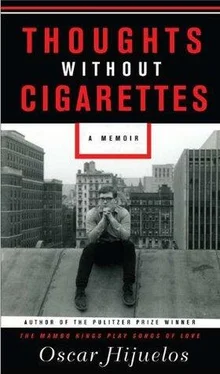As in a fairy tale, Maya simply coveted her nephew with an eye to raising him as her own. But far from adopting a new approach toward my mother — kindness might have gone a long way — she went on disparaging my mother’s maternal abilities to my father any time she could, in fact, making my mother out as a reckless soul. This envidia —or envy — was so pronounced that my aunt Maya had tried to wrest my older brother away from my mother after an incident over which my mother had had no control. My brother had been crawling along the floor when, by some caprice, he had opened the lower door of a kitchen cabinet just beneath the sink, happening upon a can of rat poison — the rats in that apartment, which came up from the basement below us through a garbage chute and the spaces around loosened steam pipes, were abundant — and this poison José managed somehow to eat, perhaps because of its candied smell. Doubled over, he turned blue and, apparently lifeless, had to be rushed to St. Luke’s. (His recovery, after his stomach was pumped, had been, in fact, a close call.) Given her state of mind, Maya, who had come home from her job at Macy’s, blamed my mother’s carelessness for the calamity. According to Maya, she had proved herself unfit to look after her own son, and, dutifully, my aunt volunteered to take my brother off their hands; and while my father resisted her — though with difficulty, for Maya, as the eldest of the sisters, had practically raised him — he ended up holding my mother at fault. Worst of all, my father, to whom his own blood family remained the most important thing in life, wouldn’t tolerate as much as a bad word from my mother about his sister, which is to say that in any such discussions, she never had a chance.
But Maya’s efforts did not quite work out for her the way she had hoped. Even her influence could not change my father’s mind about my mother, though having an infant in the apartment seemed to make no difference to his nocturnal routines. Now when my father came home, a tie loosened around his neck, at four in the morning, my mother had a crib and a crying infant in the room. Aside from that, it seems that he treated her well enough, even lovingly, but bit by bit, in those years, he slowly began to change. My mother has always blamed it on a combination of that nightlife and his new job at the hotel. He began drinking in the clubs and dance halls, a little at first and then more and more, perhaps to have a good time or to make some liaison easier on his conscience— But why would he feel guilty? He was a Cuban after all —or because he sometimes felt homesick for his family back in Cuba, especially for his beloved brother, Oscar. Still, even my mother would admit that his drinking didn’t really worsen, nor did his melancholy deepen, until 1945, the year the war ended.
By then, he had started to improve his standing in the kitchens of the hotel; well liked and affable, working around not only other Cubans like himself but immigrants from Italy, Greece, and Poland (whose languages he began to absorb), he found a second home in the Men’s Bar kitchen. And though he would have made far more money as a waiter — a job offered to him — he was, as my mother, sighing, put it one day, too proud to earn his livelihood serving others. (And can you imagine what emotions she, raised in a house with servants, felt when treated like one?) So he remained in that kitchen, learning to prepare chicken and lamb and grill seared steaks, got a raise to about a dollar an hour, and, despite some reservations about New York — for there were always people around to stare resentfully if they overheard someone speaking Spanish on the street — felt optimistic about the future.
At some point, he began a campaign to bring his older brother, Oscar, to New York, writing him constantly, and, I suppose, while knowing that his brother would never abandon his life in Jiguaní for good, he did his best to persuade him to visit — much in the same spirit his own life in that city had started. In this, he eventually succeeded, though without any expectations that his brother, a campesino to his bones, would ever stay. With four children by two marriages, the eldest aged twelve, and running his own farm, my uncle finally — perhaps reluctantly — consented to make the journey, if only to see his younger brother again.
That autumn, my uncle Oscar rode south to the provincial capital, Santiago de Cuba, to procure a travel visa for the States and, heading homeward at dusk a few days later, was crossing a meadow on his horse when he found himself in the gathering darkness of a storm: At some point, a lightning bolt flashed around him, and, when his horse reared back, he tumbled off his saddle and flew headlong into the trunk of a tree, breaking his neck. I imagine my father and his sisters got the news by telegram, and who of his sisters rushed to Cuba, if any, I can’t say. But he lingered, it’s been said, in a semiconscious state for twenty-six days — perhaps it was thought he would eventually recover — before he finally succumbed, without so much as ever laying eyes on my father again.
After his brother’s death, the sadness of life came to be written all over my father’s face, and he must have lamented the fact that instead of showing that other Oscar Hijuelos the excitements and pleasantries of New York, his invitation had, however indirectly, delivered him to the gates of heaven, or hell, or purgatory, or to wherever such kindhearted campesino souls go when their eyes close for good: For months after, on his nights home from work, he rarely left the apartment, and assumed the posture and habits by which I would most remember him — by the kitchen table, drinking rye whiskey followed by one glass of beer after the other, a cigarette burning down until it singed the cuffs of his shirt. He slumped in misery, lashed out at my mother, swinging his arms out at her, just because he could not allow anyone else to enter into that cage of his pain. He couldn’t hear a thing that anyone said to him, not even his sisters. He’d wince with the realization that certain events cannot be undone, and, blaming himself for that tragedy, embarked upon a sea of regrets.

When I was born in 1951, at about five thirty on a summer morning, at the St. Luke’s Woman’s Hospital, my father named me after his brother, and I suppose for that reason alone, my father always accorded me a special affection. I’ve been told that as a baby I was good-natured and on the quiet side, that I rarely carried on or cried and had a certain dulzura —a sweetness — about me that, I’ve always believed, must have come from him. By the time I’d entered my infancy, his sisters had finally moved out, relocating to Miami. Borja left when her husband, Eduardo, suffering from a bad heart, became ill, and Maya and her husband soon followed. As for my father? Dividing his days between his job at the Biltmore and home, he still threw the occasional weekend party, as he and his sisters used to, the apartment filling with Cubans and Puerto Rican couples — probably a mix of his friends from the hotel and from the dance halls — as well as a few single strays, male and female alike, from around the neighborhood. On those nights, the drinks and food flowed — my father spending “too much,” as my mother would later complain, on sponging fulanos , most of whom he’d probably never see again and who, in any case, couldn’t give ni un pío —a piss — about him; but because he found it almost unbearable to be alone, those parties took place at least once a month, if not more often. His guests came for their doses of Cuban warmth, the congeniality, the music, blaring on those nights from a living room RCA console, and, aside from the fully stocked bar and the ice-packed bathtub filled with bottles of beer, the immense quantities of food, which lay stacked on platters in the kitchen. It wasn’t long before the crowd, revved up, would get onto the living room floor, dancing away. And there I would be, the little “ rubio ”—blondie — the cute little americano -looking son of that nice guy Pascual, crawling innocently along our living room floor, bounded by a forest of pleated trousers, shapely nylon-covered legs, and kicking two-toned and high-heeled shoes. My brother swears that, innocent though I may have been, I’d roll onto my back and pass the time doing my best to steal a peek at the mysteries residing inside the plump upper reaches of those swirling ladies’ dresses.
Читать дальше













